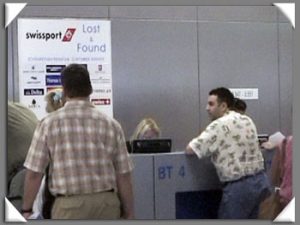When Drew and I recently visited the Great Pyramids in Egypt, our attention was instantly focused on something. You might think we were riveted by the awe-inspiring majesty of the ancient structures that we were visiting. While we were certainly thrilled to be standing at one of the 7 Wonders of the world, we couldn’t totally concentrate on the moment as we defended ourselves against the onslaught of sales pitches of the many vendors who rushed up to us as we stepped onto the Sahara sand.
If you stood still for more than a few seconds, someone would approach you, offering to sell you something, take you for a camel ride or shoot your picture. I began to think that the sellers outnumbered the tourists.
People were hawking everything imaginable to remember your experience at the Pyramids: postcards, calendars, camels (both rides on real ones and small toys) coins, stamps, papyrus pictures, and, of course, head wraps.
In fact, head wraps seemed to be the most popular item sold by the vendors, and most of the people appeared to have identical packages of white cloth which you would tie to your head with colored rope rings. These wraps looked like the traditional Arabian, white scarves with rope rings that you see in the movies. Most people were selling them for a dollar.
When we went to the Pyramids, we didn’t have it in our minds to buy a souvenir of our visit. We and our fellow travelers had spent a lot of time, money and energy to journey to the Pyramids; all we wanted was peace and quiet to enjoy the view. All the vendors wanted was to use our limited time and waning energy under the desert sun to relieve us of money for their trinkets.
In this setting of vendors barking their prices at us as we passed them, my marketing mind couldn’t help but think: How does a person selling a product that is the same or similar to his competitors distinguish himself in a saturated marketplace? The observations I made during my trip to the Pyramids are tips that you can easily employ in marketing and improving your voice-over business.

Drew and me in front of the Sphinx and Pyramids
Observation #1: The word FREE is one of the most powerful words in the English language. When someone offers you a free gift, you can’t help but feel intrigued. Of course, our society causes us to be cynical and look for the ‘the catch’ to any offer. In your voice-over business, you can entice people with free reports, free auditions, free script assistance, free revisions in short, whatever you feel adds value to your business without taking away from your bottom line. You ARE in the voice-over business to make money, aren’t you?
He proceeded to ask us if we were American. When we said we were, he told us that he loved America and wanted to travel here someday.
Observation #2: This seller was trying to create a relationship with us. People like to do business with those with whom they have a relationship. While everyone else was simply yelling prices at us, this guy was actually attempting to develop a rapport with us.
Once he had established our nationality, the Pyramid peddler suggested that it would be nice if we could also give him a gift. (Ah, HERE’S the catch!) He didn’t specifically ask for money, but we knew he wanted money. We quickly gave the so-called free gift back to him.
Observation #3: If you give away something for free, you can’t have any expectation of getting anything in return. If you anticipate a quid pro quo, you risk offending your prospects and a loss of any future sales.
Observation #4: When you’re in a sales situation, you need to have a firm price for your product (as in voice talent and services) and be able to speak to people about the benefits they will receive from spending their money with you.
We also visited the Sphinx, which is located at the site of the Pyramids. Here, the peddlers offered the same merchandise as at the Pyramids but also added scarves and crystal Pyramids. Souvenir shops lined the road, but I didn’t see an official souvenir stand at either site. I suppose that anyone who wants to sell stuff could do so.
We had successfully skirted around the sea of sellers while entering the chamber to the Sphinx. Our guide even shooed away one particularly pesky merchant by speaking rather sharply to him in Arabic. On our way out, though, Drew noticed someone selling a head wrap that was unlike the 100 he had seen prior in the day. All of the others were small pieces of white linen fabric, while this one was a large, black and white checked fabric similar to one worn by a former Mid-East leader. Drew stopped to inquire about it.
Observation #5: Find a niche and fill it. I know that may seem easier said than done, especially when I’m talking about the voice-over industry, but we all have unique voices and unique backgrounds that we bring to the microphone. Figure out your signature sound, and find a way to use your experiences in your marketing. Also, if you have some tie-in to a celebrity, use it!
Drew and the vendor haggled about the price of this head wrap for several minutes before Drew finally bought it at a price considerably lower than the dealer’s original price. However, Drew did pay more for his head wrap than the white linen wraps seen at the Pyramids and more than he originally planned to spend.
Observation #6: Just because everybody else in your sandbox is charging low prices and negotiating price cuts with every new prospect doesn’t mean that you have to follow the trend. When you cut your prices, you are the one who bleeds. If you want to charge and achieve a premium price for your voice-over talent, you need to be ready with factual, persuasive reasons based on quality, service or other aspects why the prospect should pay the extra money. For an in-depth and fascinating discussion of this subject, I cannot recommend too highly that you get Larry Steinmetz’s book How to Sell at Margins Higher Than Your Competitors: Winning Every Sale at Full Price, Rate, or Fee.
Observation #7: Even in a market that is saturated with vendors, people are willing to increase their budgets to acquire a quality product that matches their specifications.

Drew shows off his new purchase
The camel ride lasted 30-40 minutes, which was longer than we expected. During the entire ride, our drivers kept asking if everything was okay. They were eager to please and ensure that we were having a good time. However, they didn’t know a lot of English, so the rest of the conversation consisted of constant requests for money at the end of the ride.
I was uncomfortable during the ride because I only had one foot in a stirrup. I never found the stirrup on the right side, and I kept feeling like I would fall off the camel’s back. I told Moses, my driver, about this problem numerous times. Maybe he didn’t understand me since he would respond by telling me about needing money to feed his wife and 5 hungry children.
Observation #8: If your client reports a problem to you, you should fix it immediately. Listen twice as much as you talk. Do everything in your power to maintain your client’s trust.
Sami, Drew’s driver, gave the reins to Drew so Drew could steer the camel. Drew gave his camera to Sami and asked Sami to take our picture. Though we’re sure Sami doesn’t own a digital camera, he did a great job in using Drew’s camera. When people say I look extremely happy in this picture, I tell them it is because I was reunited with my Sheik of the Desert, who had been leading our little caravan of camels. Drew says he thinks I’m laughing because I know the hot, bumpy ride is almost over. 🙂

My Sheik and me on our camel ride in the Sahara Desert
Observation #9: Do the best job that you can do and express gratitude for all of your blessings. Convey your appreciation to your clients for choosing you as their voice talent and for their prompt payment of your invoices. You would do well to set up a regular system to maintain contact with them that shows them you are thinking of them and their needs, not yours.
Observation #10: We live in a global economy. If you don’t have a passport, get one. If you have a passport, use it. Travel the world to spend time in other cultures and see how other people really live as opposed to taking your world view solely from the things that the media chooses to tell you. I can’t promise that you will gain creative ideas about your voice-over business, but I can promise that you will gain a perspective about your place in this world and an appreciation for the abundant lifestyle you are privileged to lead if you are a voice-over artist.
